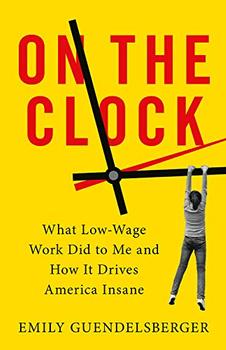Summary | Excerpt | Reviews | Beyond the Book | Readalikes | Genres & Themes | Author Bio

Critics' Opinion:
Readers' Opinion:
First Published:
Jul 2019, 352 pages
Paperback:
Jul 2020, 352 pages
 Book Reviewed by:
Book Reviewed by:
Tara Mcnabb
Buy This Book
As a culture, we put far too much blind trust in data and technology.**** Math and logic are beautiful languages. But it's so pretentious to pretend that they have adequate vocabulary to accurately describe a human, much less whether a human is happy or miserable. Our brains are the most complicated things in the known universe, with a hundred billion neurons making connections in a mind-bogglingly complex web that constantly changes. Our levels of technology aren't remotely close to being able to accurately describe that mess, and they won't be for a very long time.† Numbers and statistics just aren't up to communicating how something feels, even though
that's often extremely important information.
That's why I decided to go experience this brave new world myself — so readers can get an idea of what the modern experience of low-wage work feels like. I went to work at an Amazon warehouse, a call center, and a McDonald's — three places that are fairly representative of the future of work in America. I spent between one and two months at each, and I worked them for real, with every ounce of my Dad-infused work ethic. And at each one, productivity-enforcing technology constantly corralled me and my coworkers into the weeds like a sheepdog snapping at a herd's heels.
Working in an Amazon warehouse outside Louisville, Kentucky, I walked up to sixteen miles a day to keep up with the rate at which I was supposed to pick orders. A GPS-enabled scanner tracked my movements and constantly informed me how many seconds I had left to complete my task.
Working at a call center in western North Carolina, I was lectured about how using the bathroom too often is the same thing as stealing from the company, and had the minutes I spent in the bathroom tracked in a daily report sent to my supervisor.
Working at a McDonald's in downtown San Francisco, we were under-scheduled to the point of a constant, never-ending line of customers — everyone worked at the frantic speed of those in-the-weeds waitresses of my youth all shift, nearly every shift.
I did plenty of research beforehand, and I'd heard crazy things about
how stressful each job would be — each in its own special way, like Tolstoy's unhappy families. But at each of them, technology made it impossible to escape the weeds. And every time, my thorough research totally failed to prepare me for how dehumanizing the job felt.
We're at a strange point in the history of work. Automation of most jobs is only a decade or two away, and human workers increasingly have to compete with computers, algorithms, and robots that never get tired, or sick, or depressed, or need a day off.
Still, in industries that rely on skills that robots still aren't great at — fine motor control, speech and pattern recognition, empathy — the cheapest option is still low-wage human workers. And so many employers demand a workforce that can think, talk, feel, and pick stuff up like humans— but with as few needs outside of work as robots. They insist their workers amputate the messy human bits of themselves — family, hunger, thirst, emotions, the need to make rent, sickness, fatigue, boredom, depression, traffic — or at least keep them completely at bay.
I call these cyborg jobs — I have to have something to use as shorthand —
and they make up an increasing slice of the American labor market, including most of the postrecession job growth. With labor power crippled by the last few decades of US policy, low-wage workers today have a strong- bordering-on-mandatory incentive to crush those unuseful human parts of themselves down to atomic size. And the pressure's starting to reach unman- ageable levels.
How many cyborg jobs are there? It's hard to get good numbers on something that vague, but the statistic I find most convincing comes from a 2013 paper out of Oxford University.1 The authors tried to calculate how many and what kinds of jobs were so highly routinized that it'd be very easy to replace their human workers with computers or robots — that is, "occupations mainly consisting of tasks following well-defined procedures that can easily be per- formed by sophisticated algorithms."
Excerpted from On the Clock by Emily Guendelsberger . Copyright © 2019 by Emily Guendelsberger . Excerpted by permission of Little Brown & Company. All rights reserved. No part of this excerpt may be reproduced or reprinted without permission in writing from the publisher.





The Flower Sisters
by Michelle Collins Anderson
From the new Fannie Flagg of the Ozarks, a richly-woven story of family, forgiveness, and reinvention.

The House on Biscayne Bay
by Chanel Cleeton
As death stalks a gothic mansion in Miami, the lives of two women intertwine as the past and present collide.

The Funeral Cryer by Wenyan Lu
Debut novelist Wenyan Lu brings us this witty yet profound story about one woman's midlife reawakening in contemporary rural China.
Your guide toexceptional books
BookBrowse seeks out and recommends the best in contemporary fiction and nonfiction—books that not only engage and entertain but also deepen our understanding of ourselves and the world around us.